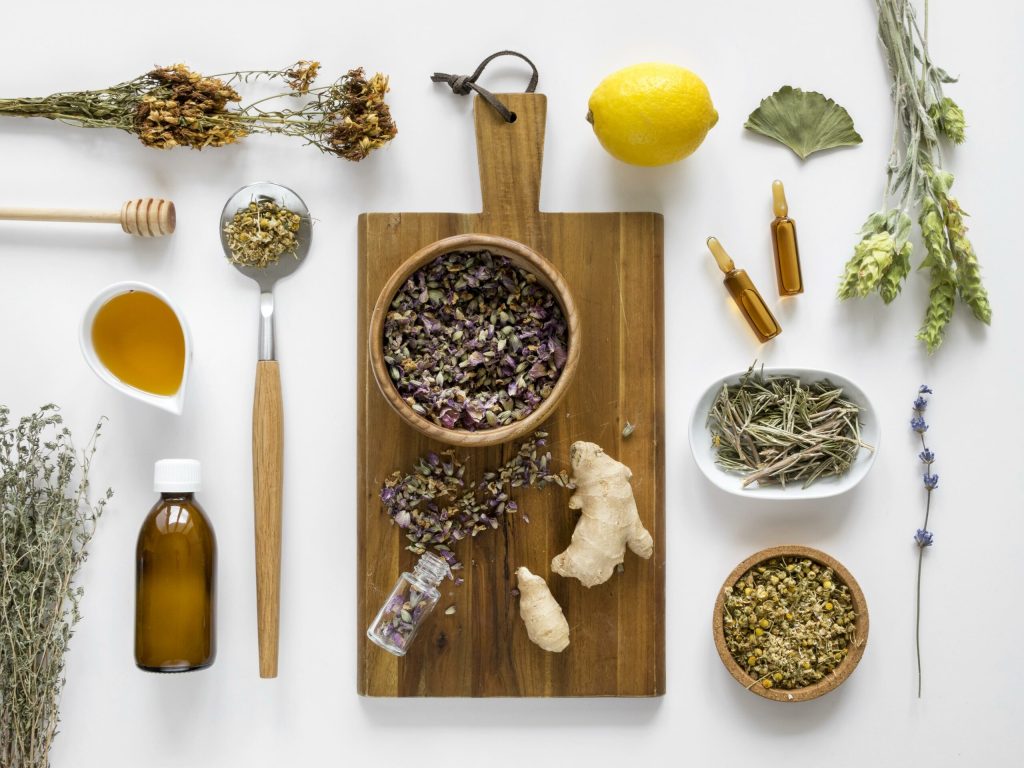\”Gut Healing Herbs: From Slippery Elm to Marshmallow Root\”: Highlighting natural herbs known to soothe the gut.
Your gut is often referred to as your \”second brain\” because of its profound impact on your overall health and well-being. An imbalanced gut can lead to various digestive issues, discomfort, and even affect your immune system. Fortunately, nature provides us with a treasure trove of healing herbs that can soothe and support gut health. In this blog post, we\’ll explore some of the most effective gut healing herbs, from Slippery Elm to Marshmallow Root.
-
Slippery Elm: Slippery Elm (Ulmus rubra) is a native North American tree known for its mucilaginous inner bark. This herb has been used for centuries to soothe various gastrointestinal ailments. Slippery Elm forms a protective layer over the mucous membranes of the digestive tract, reducing irritation and inflammation. It\’s often used to alleviate symptoms of heartburn, acid reflux, and irritable bowel syndrome (IBS).
-
Marshmallow Root: Marshmallow Root (Althaea officinalis) is another mucilaginous herb that can provide relief for digestive issues. It contains a substance called mucilage that forms a soothing and protective layer along the digestive tract. Marshmallow Root is known for its ability to ease symptoms of gastritis, ulcers, and acid reflux. It can also help with sore throats and coughs due to its soothing properties.
-
Peppermint: Peppermint (Mentha piperita) is a well-loved herb for its refreshing flavor, but it\’s also a potent digestive aid. The essential oil in peppermint leaves can relax the muscles of the gastrointestinal tract, helping to alleviate symptoms of indigestion, gas, and bloating. Peppermint tea is a popular remedy for stomach discomfort.
-
Ginger: Ginger (Zingiber officinale) has a long history of use as a digestive aid. It contains bioactive compounds, such as gingerol, which can help with nausea, motion sickness, and morning sickness during pregnancy. Ginger tea or ginger capsules can be beneficial for those with digestive issues.
-
Aloe Vera: Aloe Vera (Aloe barbadensis miller) is renowned for its soothing properties, both externally and internally. When consumed as a juice or gel, it can help soothe and repair the digestive tract. Aloe Vera is often used to alleviate symptoms of irritable bowel syndrome (IBS) and inflammatory bowel disease (IBD).
-
Chamomile: Chamomile (Matricaria chamomilla) is a gentle and calming herb that can ease digestive discomfort. It has anti-inflammatory and antispasmodic properties that make it useful for relieving symptoms of indigestion, gas, and bloating. Chamomile tea is a popular choice for soothing upset stomachs.
-
Licorice Root: Licorice Root (Glycyrrhiza glabra) has been used in traditional medicine for its anti-inflammatory and soothing properties. It can help with acid reflux, heartburn, and indigestion. However, it\’s important to use licorice root cautiously, as excessive consumption can lead to high blood pressure.
Conclusion: When it comes to gut health, turning to nature\’s remedies can be a wise choice. These gut healing herbs, from Slippery Elm to Marshmallow Root, offer natural solutions to soothe digestive discomfort and promote overall well-being. Always consult with a healthcare professional before incorporating any new herbs or supplements into your diet, especially if you have pre-existing medical conditions or are taking medications. Embrace the power of these herbal allies and discover the relief they can provide for your gut-related woes.

